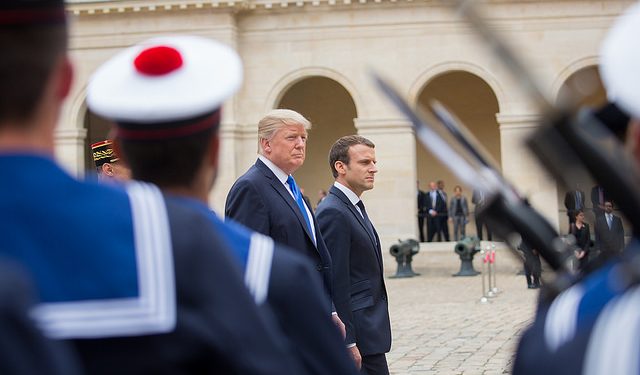The latest Soft Power 30 rankings show France’s ascent to the leading position knocking the US down to the third slot and reflecting a global preference for outward looking, business-friendly politics.
News and business analysis for Professionals in International Education
Have some pie!
France knocks US out of soft power top spot
 The report credits Emmanuel Macron's victory in the French presidential elections for the country's improved global reputation. The US's fall, meanwhile, is "unsurprising" given the volatility and indecisiveness of its government in the past year, it says. Photo: US State Department
The report credits Emmanuel Macron's victory in the French presidential elections for the country's improved global reputation. The US's fall, meanwhile, is "unsurprising" given the volatility and indecisiveness of its government in the past year, it says. Photo: US State Department The third edition of the global influence league table, produced by strategic communications firm Portland, takes into account 75 metrics in objective areas including education, culture and government. It also includes responses from a poll of 11,000 people in 25 countries on topics like a country’s foreign policy, culture and friendliness.
The report credits Emmanuel Macron’s victory in the presidential elections over the National Front party to become the country’s youngest president ever and his level of social media engagement for propelling France to the top, up from fifth place last year.
“We can see the waning dominance of anglo-American soft power as Brexit starts to bite and America First results in America Alone”
Meanwhile, the report argues the rhetoric of the Trump administration and Brexit vote have impacted the reputations of both the US and UK.
“This year’s annual rankings of global soft power reflect the major global geopolitical shifts currently underway,” noted the report’s author, Jonathan McClory. “At the top of the table, we can see the waning dominance of anglo-American soft power as Brexit starts to bite and America First results in America Alone.
“At the same time, a more confident and unified Europe looks more attractive to the rest of the world.”
The remaining top 10 saw slight upward and downward shifts but remain the same global players as last year’s list: Germany, Canada, Japan, Switzerland, Australia, Sweden and the Netherlands.
Asia’s soft power influence is also beginning to grow shown by the dominance of Asian countries in the enterprise index– led by Singapore and South Korea – Japan’s rise from 8th to 6th place in the overall rankings and China’s climb five places since the inaugural list in 2015 from 30th to 25th.
“China – while still in the bottom half of the table – made big gains in its march up the rankings as it moves to fill the global leadership vacuum left by an America in retreat,” said McClory.
“With France – this year’s winner boosted by a new pro-globalisation president – it seems the power of persuasion sits with the globalists, rather than the nationalists.”
The UK has maintained its second place spot but polling results show its influence globally has fallen, especially among Europeans.
“Had the US not fallen to an even greater extent than the UK in the international polling, Britain would have likely fallen in the rankings,” the report notes.
“That Britain’s overall score is lower than it was in 2016 should serve as a warning of what is likely to come for post-Brexit British influence…It is hard to imagine the direction of travel for British soft power and wider public opinion of the UK will be upwards in the future.”
Meanwhile the US has fallen to third place, its lowest rank since the table was established two years ago. Its polling results fell 10% and it was ranked 21st for global affairs.
“The rise of Trump could be viewed as a threat to American soft power, not least because his kind of populist rhetoric is known for devaluing international alliances,” says the report.
“Virtual exchange is changing the how and who of exchange, and may well prove itself to be a viable extension of public diplomacy”
But despite its fall in the overall rankings, the US remains at the top of the education index which takes into account the number of universities a country has in global rankings, the number of international students it hosts and number of science journal articles published.
“The country is still unrivalled in higher education, cultural production, and technological innovation,” the report notes.
The top five countries for education held on to their positions from last year with the UK coming second followed by Canada, Australia and Germany.
Denmark, South Korea and France all moved up in the top 10 while the Netherlands dropped ranks and Belgium remained in its 10th position.
The report includes commentary focusing on the roles of non-governmental bodies in public diplomacy, extolling the value of museums, cities and student virtual exchanges.
“The rise of technology has paved the way for a new type of diplomacy through virtual exchange,” writes Erin Helland director of virtual exchange at Youth for Understanding.
“Virtual exchange is changing the how and who of exchange, and may well prove itself to be a viable extension of public diplomacy, and a new means of building and exerting soft power in foreign affairs.”
Still looking? Find by category:


